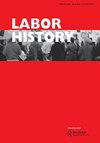Albanian labor migration, the Yugoslav private sector and its Cold War context
IF 0.7
4区 管理学
Q1 HISTORY
引用次数: 0
Abstract
ABSTRACT This contribution explores the case of Yugoslav Albanians working in the private sector in late socialist Croatia and the ways in which their involvement in tourism and private business on the Adriatic coast was shaped by Yugoslavia’s position in the Cold War context as well as domestic political dynamics. Such dynamics include the securitization of Albanians across the country following the violently quelled 1981 student demonstrations in Kosovo and the perennial suspicion held by the authorities towards private business in general, and Albanian owned private businesses in particular. The key argument advanced is that Albanian involvement in tourism and private business on the Adriatic coast, as well connections to diaspora communities in Western Europe, facilitated (micro)economic activity and mobility between nonaligned Yugoslavia, capitalist liberal democracies of Western Europe and, increasingly, by the 1980s, neighboring Warsaw Pact states. Methodologically, the research is based on the triangulation of archival documents, regional printed press and oral history interviews to demonstrate how Yugoslavia’s liminal non-aligned position and market socialist economy offered opportunity (as well as notable constraints) to Albanian private business owners and their workforces in the Cold War era and its immediate aftermath.阿尔巴尼亚劳动力迁移、南斯拉夫私营部门及其冷战背景
摘要本文探讨了南斯拉夫阿尔巴尼亚人在社会主义晚期克罗地亚的私营部门工作的情况,以及南斯拉夫在冷战背景下的地位以及国内政治动态对他们在亚得里亚海沿岸旅游和私营企业的影响。这种动态包括1981年科索沃学生示威活动遭到暴力镇压后,阿尔巴尼亚人在全国各地的证券化,以及当局对一般私营企业,特别是阿尔巴尼亚人拥有的私营企业的长期怀疑。提出的关键论点是,阿尔巴尼亚人参与亚得里亚海沿岸的旅游业和私营企业,以及与西欧侨民社区的联系,促进了不结盟的南斯拉夫、西欧资本主义自由民主国家之间的(微观)经济活动和流动性,到20世纪80年代,这些国家与邻近的华约国家之间的流动性越来越大。在方法上,这项研究基于档案文件、地区印刷媒体和口述历史采访的三角测量,以展示南斯拉夫的不结盟边缘地位和市场社会主义经济如何在冷战时期及其直接后果中为阿尔巴尼亚私营企业主及其劳动力提供机会(以及显著的限制)。
本文章由计算机程序翻译,如有差异,请以英文原文为准。
求助全文
约1分钟内获得全文
求助全文
来源期刊

Labor History
Multiple-
CiteScore
1.00
自引率
28.60%
发文量
44
期刊介绍:
Labor History is the pre-eminent journal for historical scholarship on labor. It is thoroughly ecumenical in its approach and showcases the work of labor historians, industrial relations scholars, labor economists, political scientists, sociologists, social movement theorists, business scholars and all others who write about labor issues. Labor History is also committed to geographical and chronological breadth. It publishes work on labor in the US and all other areas of the world. It is concerned with questions of labor in every time period, from the eighteenth century to contemporary events. Labor History provides a forum for all labor scholars, thus helping to bind together a large but fragmented area of study. By embracing all disciplines, time frames and locales, Labor History is the flagship journal of the entire field. All research articles published in the journal have undergone rigorous peer review, based on initial editor screening and refereeing by at least two anonymous referees.
 求助内容:
求助内容: 应助结果提醒方式:
应助结果提醒方式:


